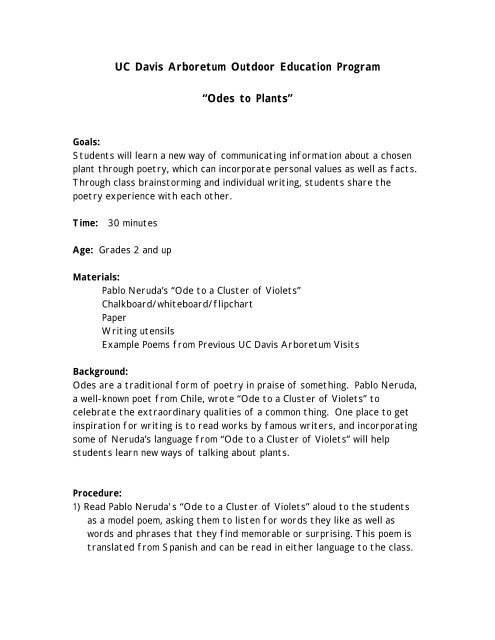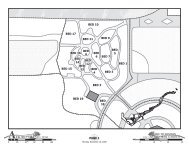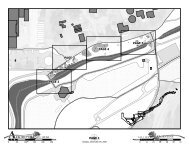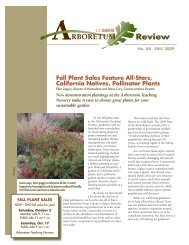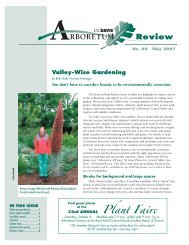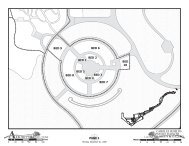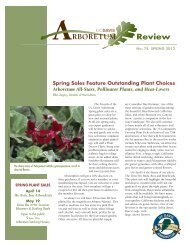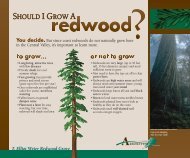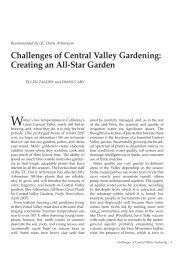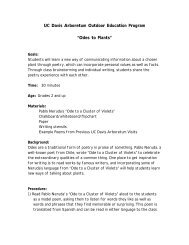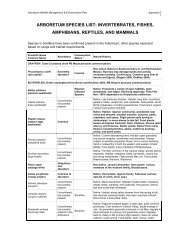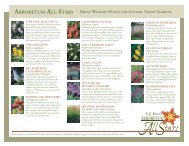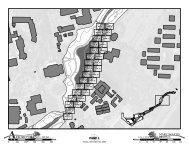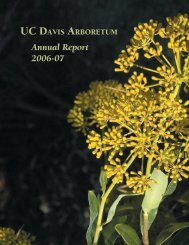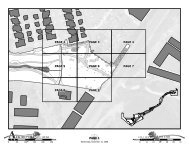Odes to Plants - the UC Davis Arboretum
Odes to Plants - the UC Davis Arboretum
Odes to Plants - the UC Davis Arboretum
Create successful ePaper yourself
Turn your PDF publications into a flip-book with our unique Google optimized e-Paper software.
<strong>UC</strong> <strong>Davis</strong> <strong>Arboretum</strong> Outdoor Education Program<br />
“<strong>Odes</strong> <strong>to</strong> <strong>Plants</strong>”<br />
Goals:<br />
Students will learn a new way of communicating information about a chosen<br />
plant through poetry, which can incorporate personal values as well as facts.<br />
Through class brains<strong>to</strong>rming and individual writing, students share <strong>the</strong><br />
poetry experience with each o<strong>the</strong>r.<br />
Time: 30 minutes<br />
Age: Grades 2 and up<br />
Materials:<br />
Pablo Neruda’s “Ode <strong>to</strong> a Cluster of Violets”<br />
Chalkboard/whiteboard/flipchart<br />
Paper<br />
Writing utensils<br />
Example Poems from Previous <strong>UC</strong> <strong>Davis</strong> <strong>Arboretum</strong> Visits<br />
Background:<br />
<strong>Odes</strong> are a traditional form of poetry in praise of something. Pablo Neruda,<br />
a well-known poet from Chile, wrote “Ode <strong>to</strong> a Cluster of Violets” <strong>to</strong><br />
celebrate <strong>the</strong> extraordinary qualities of a common thing. One place <strong>to</strong> get<br />
inspiration for writing is <strong>to</strong> read works by famous writers, and incorporating<br />
some of Neruda’s language from “Ode <strong>to</strong> a Cluster of Violets” will help<br />
students learn new ways of talking about plants.<br />
Procedure:<br />
1) Read Pablo Neruda's “Ode <strong>to</strong> a Cluster of Violets” aloud <strong>to</strong> <strong>the</strong> students<br />
as a model poem, asking <strong>the</strong>m <strong>to</strong> listen for words <strong>the</strong>y like as well as<br />
words and phrases that <strong>the</strong>y find memorable or surprising. This poem is<br />
translated from Spanish and can be read in ei<strong>the</strong>r language <strong>to</strong> <strong>the</strong> class.
2) Create a word “pool”, visible for <strong>the</strong> entire class on <strong>the</strong><br />
chalkboard/whiteboard/flipchart, by asking <strong>the</strong> students <strong>to</strong> repeat <strong>the</strong><br />
words and phrases <strong>the</strong>y remembered from <strong>the</strong> poem. Write <strong>the</strong>se<br />
favorite words or phrases on <strong>the</strong> board so <strong>the</strong> students can reference<br />
<strong>the</strong>m while <strong>the</strong>y create <strong>the</strong>ir poems. A word “pool” is simply a large drawn<br />
circle with all <strong>the</strong> brains<strong>to</strong>rmed words inside.<br />
3) Next create a second word pool from your <strong>UC</strong> <strong>Davis</strong> <strong>Arboretum</strong> visit.<br />
(See “<strong>UC</strong> <strong>Davis</strong> <strong>Arboretum</strong> Connection” below for ideas.) Ask <strong>the</strong><br />
students <strong>to</strong> reflect on <strong>the</strong>ir visit and share things <strong>the</strong>y remembered. If<br />
<strong>the</strong>y cannot remember <strong>the</strong> exact names of things, <strong>the</strong>y can describe<br />
<strong>the</strong>m in o<strong>the</strong>r ways.<br />
4) Now it’s time for <strong>the</strong> students <strong>to</strong> create <strong>the</strong>ir own, individual odes <strong>to</strong> a<br />
plant of <strong>the</strong>ir choice. Encourage <strong>the</strong> students <strong>to</strong> choose phrases and/or<br />
words from both word pools <strong>to</strong> help expand <strong>the</strong>ir ideas. Students can<br />
also use <strong>the</strong>ir own words and phrases <strong>to</strong> complete <strong>the</strong>ir poems.<br />
Remind students that <strong>the</strong> whole poem does not have <strong>to</strong> be in praise of<br />
<strong>the</strong>ir plant. They can say both positive and negative things about it, as<br />
long as <strong>the</strong>y use specific, descriptive terms.<br />
The beginnings of some of Neruda’s lines (“You<br />
resemble_____________,” “Up close, your fragrance_____________,”<br />
and “You deliver__________________”) can be written on <strong>the</strong> board<br />
for optional use by students who might wonder how <strong>to</strong> get started.<br />
One last reminder <strong>to</strong> <strong>the</strong> students: <strong>the</strong>ir grammar, spelling, punctuation<br />
and appearance of <strong>the</strong>ir poem can be whatever <strong>the</strong>y choose. It does not<br />
have <strong>to</strong> be perfect or rhyme.<br />
5) After 15-20 minutes of writing time, give students a chance <strong>to</strong> share with<br />
<strong>the</strong> class.<br />
Extension:<br />
Have your students create o<strong>the</strong>r types of poems (see example poems from<br />
previous <strong>UC</strong> <strong>Davis</strong> <strong>Arboretum</strong> visits) or have <strong>the</strong>m illustrate <strong>the</strong>ir poems.
<strong>UC</strong> <strong>Davis</strong> <strong>Arboretum</strong> Connection:<br />
“<strong>Odes</strong> <strong>to</strong> <strong>Plants</strong>” can fur<strong>the</strong>r help personalize <strong>the</strong> <strong>UC</strong> <strong>Davis</strong> <strong>Arboretum</strong><br />
experience for students. During <strong>the</strong>ir visit, students learned that both<br />
animals and plants have life cycles that include birth/germination,<br />
reproduction, and death. They also discovered plants and animals interact<br />
during <strong>the</strong> different stages of <strong>the</strong>ir life cycles. To connect “<strong>Odes</strong> <strong>to</strong> <strong>Plants</strong>”<br />
<strong>to</strong> <strong>the</strong>se <strong>the</strong>mes, remind students of plants <strong>the</strong>y saw (Valley Oak, Grey Pine<br />
a.k.a. Foothill Pine, Coast Redwood, California Poppy, Western Redbud, Toyon,<br />
and Prickly Pear Cactus) and things <strong>the</strong>y learned in <strong>the</strong> <strong>UC</strong> <strong>Davis</strong> <strong>Arboretum</strong>,<br />
and encourage <strong>the</strong>m <strong>to</strong> write about <strong>the</strong>m in <strong>the</strong>ir poems.<br />
To read more poems inspired by <strong>the</strong> <strong>UC</strong> <strong>Davis</strong> <strong>Arboretum</strong>, request a copy of<br />
“Where Do I Walk? Poetic Perambulations in <strong>the</strong> <strong>UC</strong> <strong>Davis</strong> <strong>Arboretum</strong> by<br />
Writers of All Ages” edited by Maria Melendez, Brooke Byrd, and Adam<br />
Smith. Copies can be purchased for $5.00 from <strong>the</strong> <strong>Arboretum</strong>, 752-4880.<br />
All proceeds benefit <strong>the</strong> education program.<br />
This activity was created by Maria Melendez, <strong>UC</strong> <strong>Davis</strong> <strong>Arboretum</strong> Writer in<br />
Residence, and modified by Megan Chiosso and Betsy Faber of <strong>the</strong> <strong>UC</strong> <strong>Davis</strong><br />
<strong>Arboretum</strong> Education Department, 2003.
Example Poems from Previous <strong>UC</strong> <strong>Davis</strong> <strong>Arboretum</strong> Visits<br />
My Family (around Putah Creek)<br />
My bro<strong>the</strong>r is a mallard duck looking for his mate, with his green head he can show off <strong>to</strong><br />
any girl in <strong>to</strong>wn.<br />
My mo<strong>the</strong>r is a buckeye with her branches swaying over me.<br />
My fa<strong>the</strong>r is a squirrel with acorns in his cheeks, chuckling.<br />
My cat is gray with white droplets that make her look like she’s been in a rain s<strong>to</strong>rm. My<br />
o<strong>the</strong>r cat is a fluffy spiky pinecone.<br />
I am a quiet but happy little squirrel hopping from one tree <strong>to</strong> ano<strong>the</strong>r. I can fly through<br />
<strong>the</strong> air on a joyful flight.<br />
—Teresa Ludwig, 4 th grade<br />
Willett Elementary, <strong>Davis</strong><br />
As I Walk Through <strong>the</strong> <strong>Arboretum</strong><br />
Inspired by Joseph Bruchac’s “Walking at Night in <strong>the</strong> Desert”<br />
As I walk<br />
through <strong>the</strong> <strong>Arboretum</strong><br />
I ask <strong>the</strong> redbud with its flames<br />
of flowers,<br />
May I pick your flowers?<br />
When it answers, I hear <strong>the</strong> flowers snap<br />
off <strong>the</strong> branches and fall in<strong>to</strong> my hand.<br />
As I walk by <strong>the</strong> oak tree, I ask<br />
May I have some shade?<br />
And when it replies, I feel <strong>the</strong> coolness<br />
of <strong>the</strong> branches blocking <strong>the</strong> boiling sun.<br />
—Anna LeFlore, 3 rd grade<br />
Cesar Chavez Elementary, <strong>Davis</strong>
In My Dream<br />
In my dream I saw a determined acorn.<br />
He was running as hard as he could.<br />
He stumbled, fell, and rolled off in<strong>to</strong> <strong>the</strong> creek.<br />
The bossy grinding rock ran closer.<br />
The acorn was wounded.<br />
It was almost night,<br />
“Help,” cried Acorn. “Help me I’m wounded.”<br />
“This isn’t a game, come for me.”<br />
An egret came and carried him home.<br />
—Ashi Imtiaz, 4 th grade<br />
<strong>Davis</strong><br />
A Pound of Color: Flora and Fauna<br />
I watch <strong>the</strong> screeching vulture high above me,<br />
And <strong>the</strong> bearded dragon zooms across my face.<br />
When little animals poke <strong>the</strong>mselves<br />
on my prickly cactus, it makes me laugh.<br />
Sometimes I laugh so hard I start a sand s<strong>to</strong>rm.<br />
I am <strong>the</strong> desert.<br />
—Samantha Gaynor, 4 th grade<br />
Patwin Elementary, <strong>Davis</strong><br />
Poems selected from Poetry is Everywhere: An Anthology of Wild Yolo Poetry by Maria<br />
Melendez, <strong>UC</strong> <strong>Davis</strong> <strong>Arboretum</strong> Writer in Residence.


